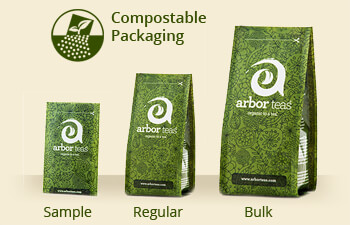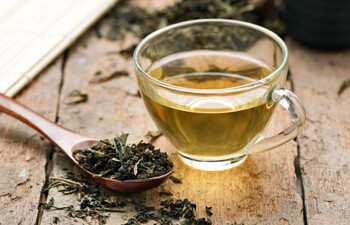Organic Decaf Green Tea

Enjoy the goodness of organic green tea without the caffeine! This organic and Fair Trade Certified Decaf Green Tea hails from the Putharjhora Estate in the Oodlabari District in northern India which produces a hearty leaf that can hold up to the decaffeination process and still pack a great vegetal flavor and medium body into each cup. Because this tea is decaffeinated using a state-of-the art carbon dioxide (CO2) decaffeination process, the spinach, endive and mineral notes of the organic loose tea come through nicely. Also, CO2 decaffeination does not involve the use of harmful chemicals, so the resulting product is simply a healthy cup of organic decaf tea with most of the caffeine removed (and no chemical overtones)!
Ingredients: organic and Fair Trade Certified Indian decaf green tea
What are Decaffeinated Teas?

All true teas contain caffeine. Decaffeinated teas are leaves from the plant Camellia sinensis that have had at least 97.5% of the caffeine removed. The term “decaffeinated” is different from “caffeine free.” Decaffeinated refers to a product that originally contained caffeine (like Camellia sinensis) and underwent a process to remove most of its caffeine content. Caffeine-free, on the other hand, refers to a product (like many of our herbal teas) that never contained caffeine to begin with. For our decaf teas, we exclusively use the carbon dioxide (CO2) method of decaffeination. We believe this is the safest form of decaffeination, and retains the greatest flavor and health benefits.
Read our field notes from our visit to a decaffeination plant!
Steeping Instructions

At Arbor Teas, we believe tea should be brewed to suit your personal taste. We’re happy to make recommendations to get you started, but don’t hesitate to experiment! When brewing your tea, your main considerations are tea quantity, water temperature, and steeping time. We recommend green and white teas to be steeped for 2 to 3 minutes in water heated to not-quite-boiling, just as bubbles begin to form on the bottom of the pan (approximately 170 to 180 degrees F). For the best flavor, use fresh water whenever possible. Try not to steep your tea longer than necessary, as you’ll extract undesirable bitterness from the leaves. If you want a stronger brew, don’t steep longer, just use more tea. And don’t forget to re-steep your tea leaves to get the most out of your leaf!
Looking for more info? Check out our How-To Guides and Eco-Brewing Tips!
Staff Perspectives
 Aubrey
Aubrey
"A light-bodied decaffeinated green tea that has no bitterness. Be sure to brew with 180° F water, as I find this green tea to be particularly sensitive to water temperature."
Health Benefits

Like all true tea, green tea offers many potential health benefits. Research has found that tea (Camellia sinensis) can have many positive effects on human health, including improved cardiovascular function, cancer risk reduction, improved immune function, improved oral health, and help with weight management. Tea is also full of polyphenols, which are a class of antioxidant that help your body maintain homeostasis and balance your stress levels.
Green tea specifically is known for its array of health benefits, which have been supported by a growing number of studies. Green tea research has demonstrated that it may be an effective anticancer agent for breast cancer, lung cancer, kidney cancer and prostate cancer, among others. Studies have shown a link between green tea and weight loss, and the ability to modulate energy metabolism, aid in body fat regulation, and possibly promote preferential loss in abdominal fat. Research has also shown that green tea may increase performance for short term memory tasks, as well as being increasing potency of antibiotics. Other peer-reviewed studies link green tea to healthy skin, help with lowering cholesterol, and regulating diabetes. It’s important to keep in mind that many of these studies monitor subjects who drink several cups of green tea per day.
For more information about the health benefits of green tea, and for direct sources of the above information, check out our Tea Health Benefits page!
Please note: the information above is for educational purposes only and has not been evaluated by the Food and Drug Administration. This information is not intended to diagnose, treat, cure, or prevent any disease.








